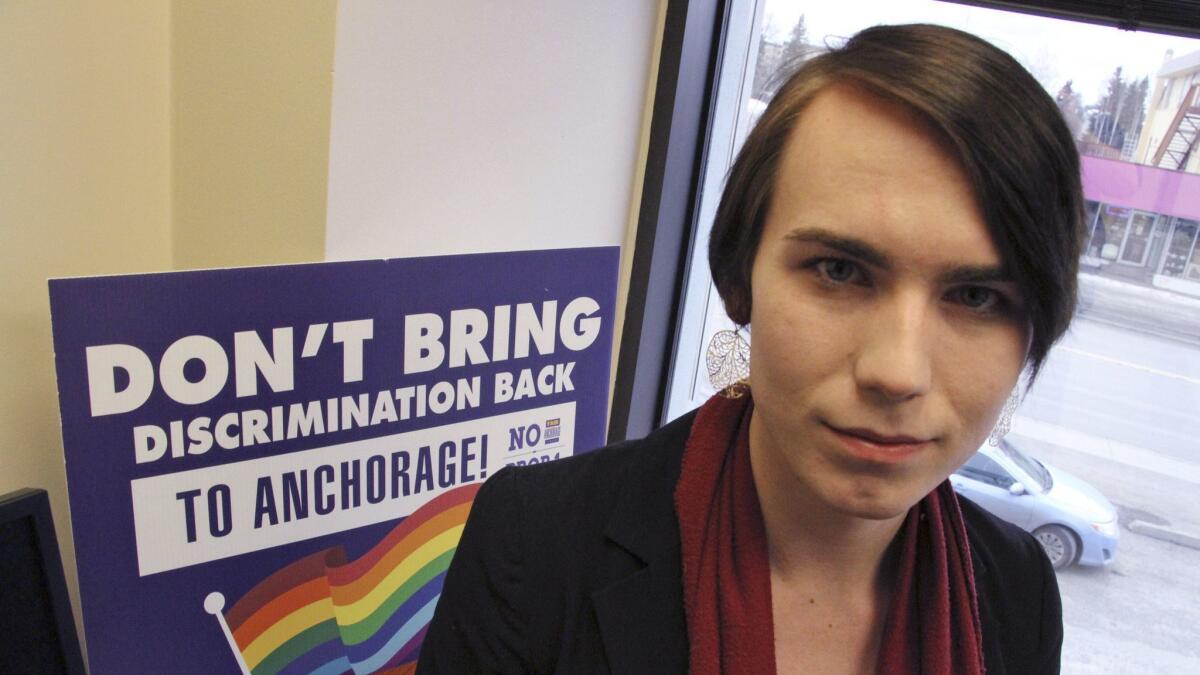Mix of setbacks and gains unsettles many transgender Americans

Reporting from New York â For transgender Americans, 2018 has been marked by series of advancements and setbacks.
The steps forward have included numerous legislative actions and court rulings buttressing civil rights and a victory by a transgender candidate in Vermontâs Democratic gubernatorial primary.
The steps back have included the Trump administration rolling back protections, and anti-transgender vitriol that caused an Oklahoma townâs schools to be closed for two days in August after adults made threatening comments on Facebook about a 12-year-old transgender studentâs use of a girlsâ bathroom.
And the coming weeks may be even more unsettling, ahead of the first statewide vote on whether anti-discrimination protections should extend to transgender people.
On the Nov. 6 ballot in Massachusetts is a measure drafted by conservative activists that would repeal a 2016 state law â passed with bipartisan support â that provides such protections in public accommodations, including bathrooms and locker rooms.
Though Massachusetts is among the most liberal states, and the first to legalize same-sex marriage, recent polls indicate voters are closely divided on the ballot measure.
Transgender attorney Kasey Suffredini, co-chair of the campaign seeking to preserve the 2016 law, calls the measure âone of the single biggest threats to equality in recent memory.â If the pro-repeal side wins, he predicts, opponents of LGBTQ rights will try to scale back nondiscrimination protections in other states.
Uncertainty about the outcome in Massachusetts has added to a sense among some transgender Americans that their recent civil rights gains are fragile and their acceptance by fellow citizens is far from universal.
âI just try to focus on the long run,â said Jennifer Finney Boylan, a transgender writer and professor. âWeâre in this less for ourselves than for our children, whom I pray will grow up in a world less cruel than this one.â
The progress in 2018 has included several cities and states making it easier for transgender people to change their gender on identification documents. Courts have upheld policies enabling transgender students to use the bathrooms of their choice at school. Connecticut became the first state giving transgender inmates the right to be housed in prisons matching their gender identity.
Among other breakthroughs: A best-foreign-film Oscar for the transgender-themed film, âA Fantastic Woman,â and transgender candidate Christine Hallquistâs Democratic nomination in the Vermont governorâs race.
But Hallquistâs triumph had a downside: She says sheâs been targeted with a stream of death threats and other personal attacks during her candidacy.
In early September, transgender activists got a jolting reminder that even some allies might belittle them.
At the national meeting of NLGJA, the Association of LGBTQ Journalists, anger was sparked when gay emcee and TV weatherman Marshall McPeek began the closing ceremony by welcoming âladies and gentlemen, things and its.â
McPeek, of Columbus, Ohio, soon apologized, as did NLGJA, but many transgender people were outraged. The journalism organization promised to become more diverse and inclusive, and McPeek resigned from the group while promising to learn from his mistakes.
More broadly, transgender-rights activists are angered at moves by President Trump and his administration to undermine gains achieved before his election. Trump is seeking to ban transgender people from military service, although that effort has stalled in court.
The administration rescinded an Obama administration guideline advising schools to let transgender students use the bathroom of their choice. And it has asserted that civil rights laws donât protect transgender people from discrimination on the job.
Transgender attorney Shannon Minter, legal director of the National Center for Lesbian Rights, said he remained optimistic about the overall progress, citing favorable court rulings, broad resistance to the military ban, and new guidelines from the American Academy of Pediatrics for how parents and others can support transgender children.
These changes âreflect a growing understanding on the part of families, communities, courts and elected officials that transgender people are part of the fabric of our society,â Minter said.
In April, transgender people got some support from voters in Anchorage. By a 6-point margin, they defeated a ballot measure that would have repealed a trans-inclusive civil rights ordinance and required transgender people to use public bathrooms and locker rooms consistent with their gender at birth.
For activists, that result was heartening in light of events in Houston in 2015 after its City Council adopted an ordinance that included protections for transgender people using restrooms based on gender identity. Opponents of the ordinance gathered enough signatures for a repeal referendum, then campaigned using the slogan âNo Men in Womenâs Bathrooms.â By 61% to 39%, the anti-bias ordinance was repealed.
Now, the divisive issue is resurfacing in Massachusetts, where the campaign seeking to repeal the 2016 state law is using Houston-style messaging.
âThe law puts women, children and vulnerable minoritiesâ safety at risk,â says Keep MA Safe. âIt allows a person to self-identify as any gender in order to use whatever bathroom, locker room or shower facility they choose â even convicted sex offenders.â
Transgender-rights supporters consider this argument malicious. They say 20 states and scores of cities have experienced no significant public safety problems linked to their policies allowing transgender people to use public bathrooms of their choice.
More to Read
Sign up for Essential California
The most important California stories and recommendations in your inbox every morning.
You may occasionally receive promotional content from the Los Angeles Times.










